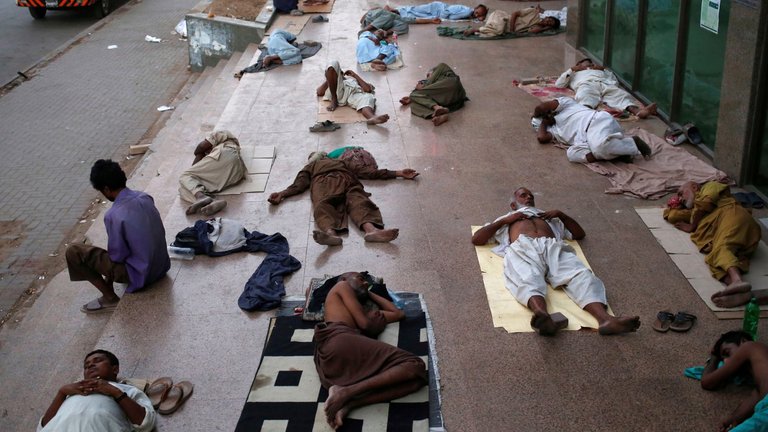Diseases, cancers, places becoming hotter, ozone deplection, death roll on heat waves, ice melting, water level rising, flood disasters, tsunamis, earthquakes, extinctiion of different species all this are our responsibilities – hunting, deforestation, emission of Carbons, chloroflorocarbons(CFCs) etc over the years due to our ignorance our home(Earth) is dying and the future generations may not have a comfortable home to call their own and curse us for that.

Ice Melting
Source: eko-planet

A little girl with cancer
source: kidshealth
Now it’s our responsibility to prevent that and build a sustainable home for ourselves and future generations. We Go Green!
First let me introduce to you to Environmental Sustainabiility - this is the process of change such that expoiltation of resources, direction of investments, technological developments are all geared towards both current and future potentials to meet human needs and aspirations(Wikipedia). The Organizing principle for sustainability is sustainable development.
Sustainable development is the development the enables the present generation to harness the available resources to meet their needs without compromising the ability of the future generations to the same. And we can achieve this by being wise and change our approach towards nature and natural resources in other words we go green, though it may take long but the reward is a conducive and sustainable environment for us and the future generations.

Source: rrd
So how do we save our home?
Here are steps by worldwatch institute on 10 ways to Go Green and even Save Green. One of which I feel could be adopted everywhere in the world . Check it out!
Save energy to save money.
- Set your thermostat a few degrees lower in the winter and a few degrees higher in the summer to save on heating and
cooling costs. - Install compact fluorescent light bulbs (CFLs) when your older incandescent bulbs burn out.
- Unplug appliances when you're not using them. Or, use a "smart" power strip that senses when appliances are off and cuts "phantom" or "vampire" energy use.
- Wash clothes in cold water whenever possible. As much as 85 percent of the energy used to machine-wash cloth goes to heating the water.
- Use a drying rack or clothesline to save the energy otherwise used during machine drying.
- Set your thermostat a few degrees lower in the winter and a few degrees higher in the summer to save on heating and
Save water to save money.
- Take shorter showers to reduce water use. This will lower your water and heating bills too.
- Install a low-flow showerhead. They don't cost much, and the water and energy savings can quickly pay back your investment.
- Make sure you have a faucet aerator on each faucet. These inexpensive appliances conserve heat and water, while
keeping water pressure high. - Plant drought-tolerant native plants in your garden. Many plants need minimal watering. Find out which occur
naturally in your area.
Less gas = more money (and better health!).
- Walk or bike to work. This saves on gas and parking costs while improving your cardiovascular health and reducing your risk of obesity.
- Consider telecommuting if you live far from your work. Or move closer. Even if this means paying more rent, it could save you money in the long term.
- Lobby your local government to increase spending on sidewalks and bike lanes. With little cost, these improvements an pay huge dividends in bettering your health and reducing traffic.
Eat smart.
- If you eat meat, add one meatless meal a week. Meat costs a lot at the store-and it's even more expensive when you consider the related environmental and health costs.
- Buy locally raised, humane, and organic meat, eggs, and dairy whenever you can. Purchasing from local farmers keeps money in the local economy.
- Whatever your diet, eat low on the food chain. This is especially true for seafood.
Skip the bottled water.
- Use a water filter to purify tap water instead of buying bottled water. Not only is bottled water expensive, but it generates large amounts of container waste
- Bring a reusable water bottle, preferably aluminum rather than plastic, with you when traveling or at work.
Think before you buy.
- Go online to find new or gently used secondhand products. Whether you've just moved or are looking to re-decorate, consider a service like craigslist or FreeSharing to track down furniture, appliances, and other items cheaply or for free.
- Check out garage sales, thrift stores, and consignment shops for clothing and other everyday items.
- Watch a video about what happens when you buy things. Your purchases have a real impact, for better or worse.
Borrow instead of buying.
- Borrow from libraries instead of buying personal books and movies. This saves money, not to mention the ink and paper that goes into printing new books.
- Share power tools and other appliances. Get to know your neighbors while cutting down on the number of things cluttering your closet or garage.
Buy smart.
- Buy in bulk. Purchasing food from bulk bins can save money and packaging.
- Wear clothes that don't need to be dry-cleaned. This saves money and cuts down on toxic chemical use.
- Invest in high-quality, long-lasting products. You might pay more now, but you'll be happy when you don't have to replace items as frequently (and this means less waste!).
Keep electronics out of the trash.
- Keep your cell phones, computers, and other electronics as long as possible.
- Donate or recycle them responsibly when the time comes. E-waste contains mercury and other toxics and is a growing environmental problem.
- Recycle your cell phone.
- Ask your local government to set up an electronics recycling and hazardous waste collection event.
10.. Make your own cleaning supplies.
- The big secret: you can make very effective, non-toxic cleaning products whenever you need them. All you need are a few simple ingredients like baking soda, vinegar, lemon, and soap.
- Making your own cleaning products saves money, time, and packaging-not to mention your indoor air quality.
Credits: Worldwatch

Effect of Heat wave in Karachi Pakistani city
Source: Reuters/Akhtar Soomro
Hi! I am a robot. I just upvoted you! I found similar content that readers might be interested in:
http://www.worldwatch.org/resources/go_green_save_green
great post bro